 Petzlover
Petzlover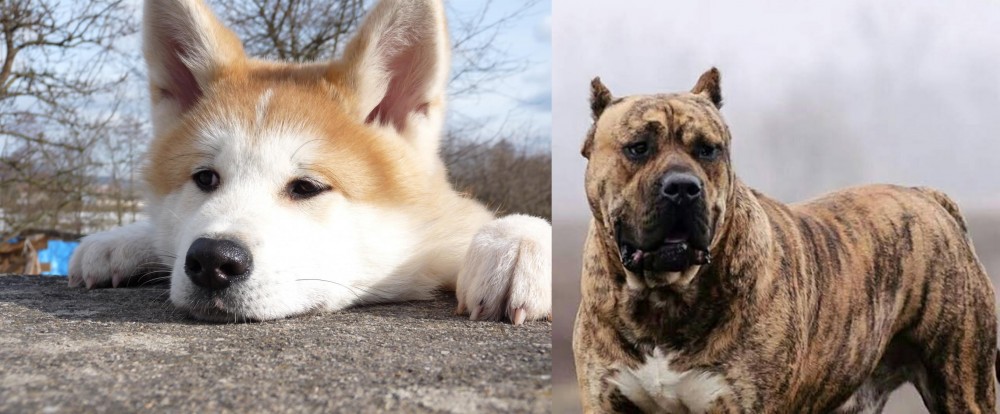 Akita is originated from Japan but Perro de Presa Canario is originated from Spain. Both Akita and Perro de Presa Canario are having almost same height. Akita may weigh 16 kg / 35 pounds lesser than Perro de Presa Canario. Akita may live 3 years more than Perro de Presa Canario. Both Akita and Perro de Presa Canario has almost same litter size. Both Akita and Perro de Presa Canario requires Low Maintenance.
Akita is originated from Japan but Perro de Presa Canario is originated from Spain. Both Akita and Perro de Presa Canario are having almost same height. Akita may weigh 16 kg / 35 pounds lesser than Perro de Presa Canario. Akita may live 3 years more than Perro de Presa Canario. Both Akita and Perro de Presa Canario has almost same litter size. Both Akita and Perro de Presa Canario requires Low Maintenance.
 Akita is a very old breed. The first information originates back in the 1600s. Akita was a royalty guard and a hunting dog. They were popular because of their bravery. Akita even attacked bears. Helen Keller brought the first Akita to America. She admired the breed because of the famous Hachiko, a dog that was known for his loyalty. Today, Akita is a popular dog in the whole world. They are lovely family pets, and if train properly they will be adorable part of any family.
Akita is a very old breed. The first information originates back in the 1600s. Akita was a royalty guard and a hunting dog. They were popular because of their bravery. Akita even attacked bears. Helen Keller brought the first Akita to America. She admired the breed because of the famous Hachiko, a dog that was known for his loyalty. Today, Akita is a popular dog in the whole world. They are lovely family pets, and if train properly they will be adorable part of any family.
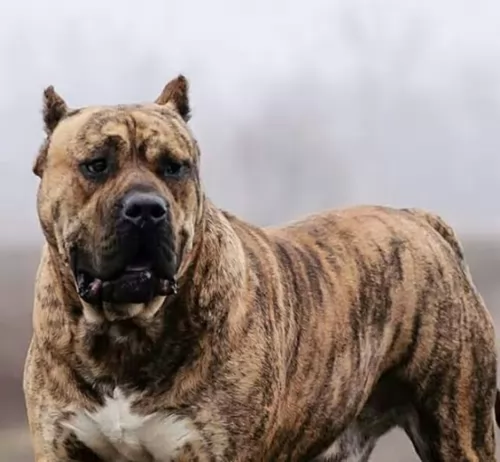 This large dog, also known as the Canary Mastiff, is a rare Molosser-type dog hailing from the Canary Islands.
This large dog, also known as the Canary Mastiff, is a rare Molosser-type dog hailing from the Canary Islands.
It does appear as if, according to records, that these dogs were also consumed at one time. The dog has also been used as a cattle dog as well as being used for dog fighting till the middle of the 1900s. Dog fighting was prohibited in the 1940s but it continued for a number of decades.
As people became interested in other dog breeds, the Presa nearly died out but some breeders revived the breed because of it having some good characteristics – territorial, brave, protective and intelligent. The FCI recognized the dog in 2011.
 Akita’s average weight is 34-54kg, while their height is 58-66cm. Females are smaller than males.
Lifespan variates from dog to dog but an average lifespan of Akita is 11-15 years. However, if you take care of your dog with a proper diet and regular vet checks they can live longer than average.
Litter Size of Akita is 7-8 puppies, but again, litter size variates because of dog’s genetics.
Other Names for Akita are Akita-Inu and Japanese Akita.
Akita’s average weight is 34-54kg, while their height is 58-66cm. Females are smaller than males.
Lifespan variates from dog to dog but an average lifespan of Akita is 11-15 years. However, if you take care of your dog with a proper diet and regular vet checks they can live longer than average.
Litter Size of Akita is 7-8 puppies, but again, litter size variates because of dog’s genetics.
Other Names for Akita are Akita-Inu and Japanese Akita.
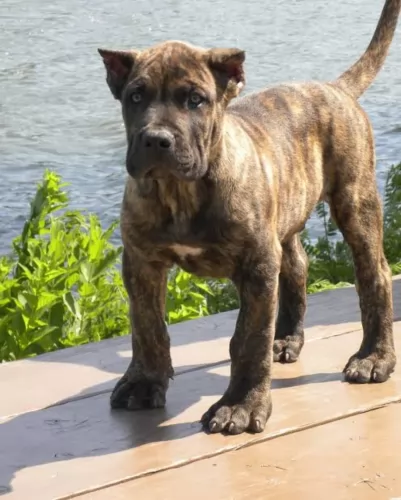 The Perro de Presa Canario or Canary Dog is large and muscular. He stands at 58 to 66cm in height and weighs anything from 40 – 70kg. He has a deep bark.
The Perro de Presa Canario or Canary Dog is large and muscular. He stands at 58 to 66cm in height and weighs anything from 40 – 70kg. He has a deep bark.
The head is broad and the ears are normally cropped to give him a more aggressive appearance. With ear cropping being banned the ears are close fitting to the head and are floppy. This is one of those dogs where the rear of the dog is slightly higher than the shoulders.
The coat is short and there is no undercoating. It is available in all different shades of fawn and brindle. The breed standard requires the dog having a black mask.
Canine experts tell us that this large working dog has got such fearless guardian characteristics that they wouldn’t recommend this dog for first time dog owners. On the other hand however, there are dog owners who claim that with good socialization, this dog becomes docile and amicable around their human family.
He is a clever dog so training and socialization will be easy and it will be worth it. This is a dog noted for its strength, it’s strong personality and potential for aggression, so training and socialization will be most important.
 Akita is a very elegant breed. They are very strong and fast, so they had been excellent guards. They sometimes can be stubborn, but they are very loyal to the family. Akita has tendencies to be aggressive to other dogs. Because of their dominant character, they can be especially aggressive towards the same sex. They are the best for one-dog houses. With family, they are very loving and gentle. The best way to train Akita is by positive training with awards. The old-fashioned way like punishing is not recommendable. Constant and firm training is important, so if you are first time owner, it might be a big challenge. If you are first time owner, consider advising with a trainer who knows the breed.
Akita is a very elegant breed. They are very strong and fast, so they had been excellent guards. They sometimes can be stubborn, but they are very loyal to the family. Akita has tendencies to be aggressive to other dogs. Because of their dominant character, they can be especially aggressive towards the same sex. They are the best for one-dog houses. With family, they are very loving and gentle. The best way to train Akita is by positive training with awards. The old-fashioned way like punishing is not recommendable. Constant and firm training is important, so if you are first time owner, it might be a big challenge. If you are first time owner, consider advising with a trainer who knows the breed.
Akita loves to be around family and to be included in family activities. They do not need a lot of activity, but daily routines of one-hour walks or jogging would be ideal for Akita. Visiting parks for dogs is not a good idea because of aggressive attitude towards other animals. If Akita does not have activities they can get bored, and you do not want bored Akita. When bored they start barking, digging, chewing, and sometimes even aggressive. Overall, they are very loving and gentle dogs who love to be around family and enjoy activities. But, they also need proper care and attention which require time and patience.
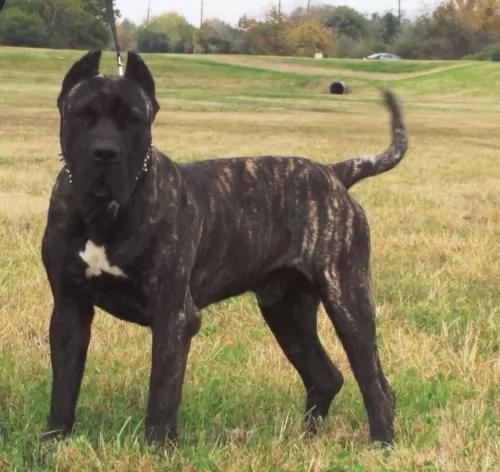 Contrary to what many people think, the Perro de Presa Canario can be a calm, gentle dog when trained and socialized properly.
Contrary to what many people think, the Perro de Presa Canario can be a calm, gentle dog when trained and socialized properly.
It is only when you bring an older, unknown dog into your midst that you would have to exercise caution with him as he can then be aggressive.
Dogs become dangerous and aggressive when they are brought up by aggressive, uncaring people. Humans are always to blame for the way a dog turns out. Provide this large dog with a loving, caring home, and he’ll show you what a remarkable pet he can be.
 Akita is a very healthy breed in general. Nevertheless, almost as every breed, Akita can develop health issues. Hip dysplasia, hypothyroidism, Progressive retinal atrophy are some of the issues Akita might have. Although, if you give your puppy Akita necessary vitamins, with a healthy diet and regular vet checks, it will a very happy and healthy dog. It is also important to know the genetics of your dog, so carefully choosing a puppy is very important.
Akita is a very healthy breed in general. Nevertheless, almost as every breed, Akita can develop health issues. Hip dysplasia, hypothyroidism, Progressive retinal atrophy are some of the issues Akita might have. Although, if you give your puppy Akita necessary vitamins, with a healthy diet and regular vet checks, it will a very happy and healthy dog. It is also important to know the genetics of your dog, so carefully choosing a puppy is very important.
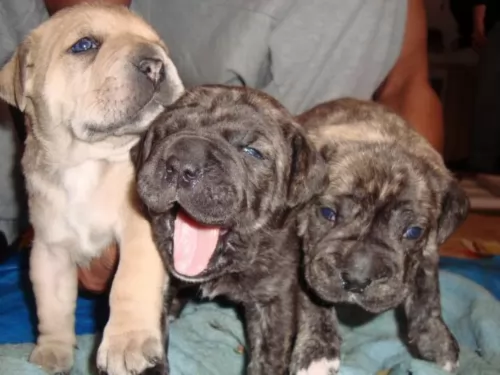 The Perro de Presa Canario can live to be between 8 and 12 years of age. Being a large breed the dog can be susceptible to hip dysplasia and other problems such as cancer and heart problems. It is highly unlikely that a well cared for dog will get any of these illnesses.
The Perro de Presa Canario can live to be between 8 and 12 years of age. Being a large breed the dog can be susceptible to hip dysplasia and other problems such as cancer and heart problems. It is highly unlikely that a well cared for dog will get any of these illnesses.
It is far better to give your dog two smaller meals a day as opposed to one bigger meal as then he tends to wolf his food down. This can lead to bloat, where the stomach swells up and worse, it twists. This dangerous situation prevents fluid and air from escaping the stomach. Your dog is restless, he paces and salivates, wanting to vomit. Bloat can affect any dog at any age.
Kidney disease can develop because of some other illness or it can develop on its own. It can even be caused by bad teeth when bacteria enters the bloodstream of the dog.
 It is always important to adjust feeding to size, activity age and built. Dogs who are bigger and have more activity will need more food. For an average Akita 3-5 cups of dry high-quality food, divided into 2 meals will be enough. They also love to eat vegetables like carrots, broccoli, and fruits like apples, oranges, watermelon, etc.
It is always important to adjust feeding to size, activity age and built. Dogs who are bigger and have more activity will need more food. For an average Akita 3-5 cups of dry high-quality food, divided into 2 meals will be enough. They also love to eat vegetables like carrots, broccoli, and fruits like apples, oranges, watermelon, etc.
Akita puppy should have more meals per day plus additional calcium and vitamins. 3-5 meals per day would be an ideal for a puppy. It is a perfect way to develop your puppy into a healthy adult dog.
Grooming Akita is not the worst, but it will require some work. They have a double coat, but they are shedding a lot. Occasional vacuuming will be a new habit that every Akita owner needs. They shed 2-3 times per year, so it is not very bad. When it not shedding, everyday brushing would be a perfect way to groom your Akita.
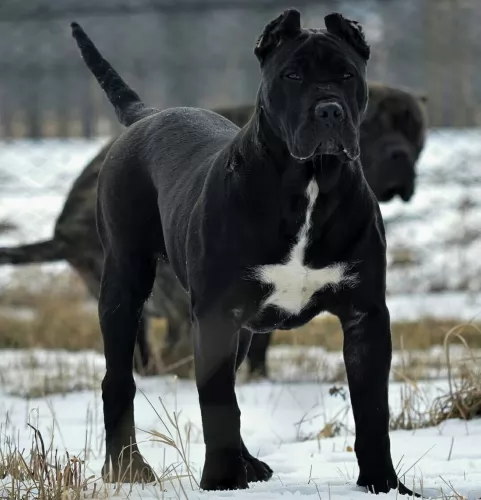 This is a short haired dog, and he isn't a heavy shedder so beyond regular twice-a-week brushing he will simply need to have his eyes and ears checked for infections.
This is a short haired dog, and he isn't a heavy shedder so beyond regular twice-a-week brushing he will simply need to have his eyes and ears checked for infections.
He will also need to have his nails clipped and to check his teeth over too. A sore, bad tooth at the back of your pet’s mouth can cause terrible pain but also play havoc with his general health.
Your Perro de Presa Canario is a high-energy dog and he will need daily exercise. He will love a good walk but he will also need something more strenuous and demanding such as ball- and rope tug-of-war games.
Try and provide your large pet with a top quality commercially manufactured food – one that is packed with vitamins and minerals instead of colorants preservatives and toxic fillers.
Break the monotony of feeding him only kibble by mixing in some cooked chicken, brown rice, sweet potato, carrots and spinach. Dogs love consistency and simplicity and simple meals like this with some raw meat thrown in occasionally will keep him healthy and happy. Never leave him without a constant supply of fresh, cool water.